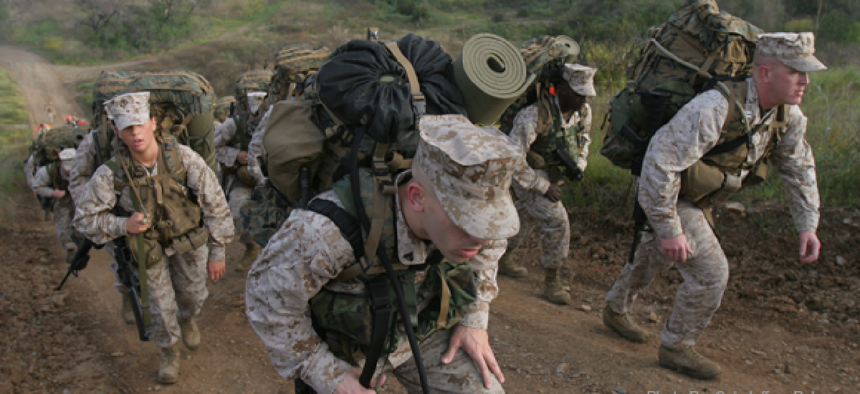Wearables may lighten the load for Marines

By transmitting their real-time supply needs to platoon leaders, Marines could carry only what they need for the immediate future.
Marines weighed down by body armor, ammunition, radios, batteries, weapons and water lack the agility of enemy combat fighters who are not carrying 100-plus pounds of supplies and equipment. Efforts to reduce the weight Marines carry have focused on experiments with wearable solar panels to reduce the need for heavy batteries and exoskeleton suits that lessen the risk of injury.
However, a new approach involves wearable devices that Marines use to transmit when they are low on supplies to their platoon leaders, who in turn can authorize in-field resupplying during the operation.
Besides giving battalion and regimental commanders data on what type of supplies run out faster and how supplies can be most effectively distributed, the system would allow soldiers to carry fewer supplies.
The personal combat assistant and reporting device (PCARD), invented by Staff Sgt. Alexander Long as part of the 2016 Innovation Challenge, is basically a small screen surrounded by a few, straightforward buttons.
According to Long, when Marines conducting field operations are low on food, water, or ammunition, they can select any of these items on the PCARD. The team’s PCARD will then wirelessly transmit that information to a ruggedized tablet carried by the squad leader. After receiving this information, squad leaders can electronically transmit supply requests to the platoon commander. The platoon commander can then authorize in-field resupplying during the operation.
In addition, the resupply needs of each team are digitally gathered from the individual Marine to the platoon level, and so this data can be compiled and analyzed.
“The common problem is the warfighter is too heavy. We spend a lot of money just trying to make the equipment lighter,” Long explained. “Units still go out with three days of supplies even if they are just walking a kilometer on patrol.”
Since winning the Innovation Challenge, Long has been working with civilian developers to build and test a prototype of the PCARD.
The first prototype has recently been tested with Marine Corps units, according to Jennifer Walsh, Innovation Challenge Lead for the Marine Corps’ NEXLOG Innovation Cell. It is scheduled to undergo further testing at Camp Pendleton Marine Corp Base in California this October.
This article was first posted to Connected Warrior, a sibling site to GCN.
NEXT STORY: Can tech arrest prisoners' cellphone use?





